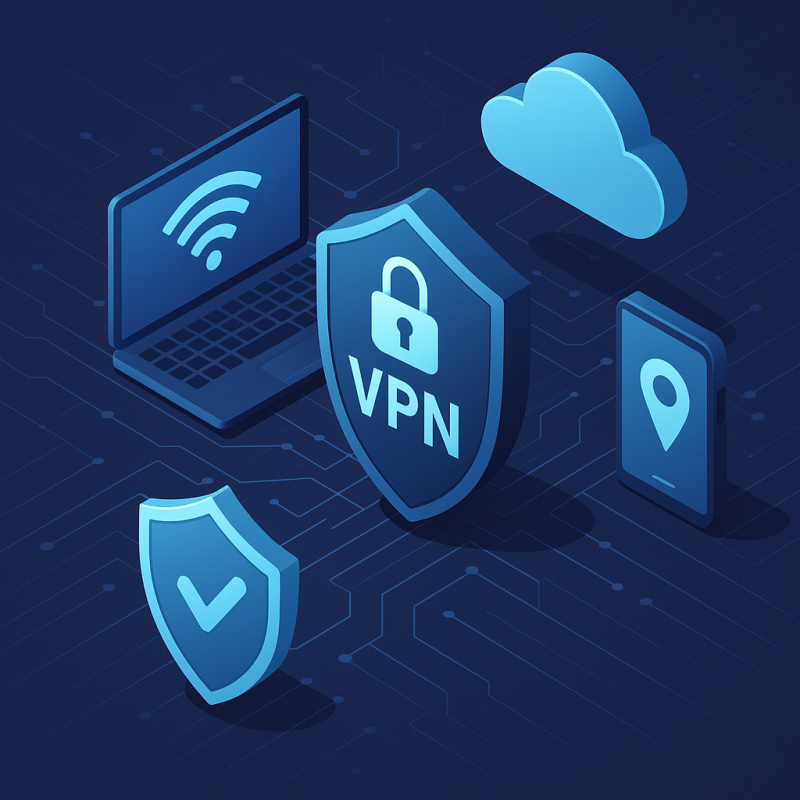Table of Contents Show
In today’s hyper-connected world, where nearly every aspect of our personal, social, and professional lives touches the internet, the need for online privacy and digital protection has never been greater. As cyber threats evolve and corporations and governments alike ramp up surveillance efforts, Virtual Private Networks (VPNs) have transformed from niche tools for tech-savvy users to mainstream essentials for anyone who values their digital freedom.
A VPN (Virtual Private Network) is no longer just a “nice-to-have.” It’s a non-negotiable part of modern digital hygiene. Whether you’re trying to secure your browsing on public Wi-Fi, access your favorite content while traveling, or simply keep your data away from data brokers and surveillance agencies, a good VPN can do it all.
This article explores the best VPNs for 2025 and, more importantly, why you absolutely need one.
Why You Need a VPN in 2025
Let’s start with the “why” before the “which.” VPNs offer multiple advantages in today’s digital ecosystem:
1. Privacy
When you browse the internet without a VPN, your internet service provider (ISP) can monitor every site you visit and every app you use. This data is often collected, sold to advertisers, or handed over to government agencies.
A VPN encrypts your internet connection, turning your browsing activity into unreadable data to any third party. Not even your ISP can see what you’re doing.
2. Security
Public Wi-Fi at airports, hotels, and coffee shops may be convenient, but it’s a playground for hackers. Without protection, your emails, passwords, and financial data are sitting ducks.
VPNs add an essential layer of security by encrypting your traffic, which makes it extremely difficult for hackers to intercept and exploit your information.
3. Bypassing Geo-Restrictions
Streaming platforms like Netflix, BBC iPlayer, Hulu, and others offer different content based on your location. A VPN can help you “trick” these platforms into thinking you’re browsing from a different country, unlocking shows and movies that might not be available in your region.
This also works for accessing censored or blocked websites in countries with restrictive internet laws, like China, Russia, or Iran.
4. Anonymity and Identity Protection
Online tracking is rampant. Social media platforms, search engines, and even e-commerce websites track your online activity and use that data to profile you.
A VPN hides your real IP address, replacing it with one from the VPN provider. This masks your location and identity, offering you more anonymity online.
5. Avoiding Bandwidth Throttling
Ever notice your internet slows down while streaming or gaming? That’s often your ISP deliberately slowing your connection. It’s called throttling, and it’s legal in many countries.
With a VPN, ISPs can’t detect what you’re doing, which helps you avoid these frustrating slowdowns.
6. Safe Remote Work
Remote work is here to stay. VPNs ensure that when you connect to company servers or exchange sensitive information with colleagues, everything stays encrypted and safe from cyber-attacks or accidental data leaks.
The Best VPNs for 2025
The VPN industry is growing fast, with dozens of providers claiming to offer the best mix of speed, security, and privacy. After reviewing hundreds of features, conducting speed tests, and analyzing privacy policies, here are the top VPNs to consider in 2025.
1. ExpressVPN
- Headquarters: British Virgin Islands
- Servers: 3,000+ servers in 94 countries
- Platforms Supported: Windows, macOS, Android, iOS, Linux, routers, smart TVs
- Price (Annual Plan): ~$6.67/month
Why It Stands Out:
ExpressVPN has consistently led the VPN market in terms of speed, reliability, and user experience. It uses the proprietary Lightway protocol, which is both secure and impressively fast. Whether you’re streaming in 4K, gaming online, or simply browsing securely, ExpressVPN handles it without breaking a sweat.
Pros:
- Proven no-logs policy (audited)
- Excellent streaming support (Netflix, Disney+, BBC iPlayer)
- 24/7 live chat support
- Easy-to-use apps
Cons:
- More expensive than some competitors
- Only 5 simultaneous connections per subscription
2. NordVPN
- Headquarters: Panama
- Servers: 6,100+ servers in 61 countries
- Platforms Supported: All major platforms including Android TV and browser extensions
- Price (Annual Plan): ~$4.59/month
Why It Stands Out:
NordVPN is a privacy-first service that’s perfect for users who want maximum security. Features like Double VPN, Onion over VPN, and threat protection make it a fortress for online activity. The recent addition of Meshnet allows secure device-to-device connections.
Pros:
- Independently audited no-logs policy
- Double VPN and advanced features
- Blazing fast NordLynx protocol
- Streaming and torrenting optimized
Cons:
- Desktop UI can be overwhelming for beginners
- Price jumps after the first year
3. CyberGhost
- Headquarters: Romania
- Servers: 9,000+ servers in 91 countries
- Platforms Supported: Windows, macOS, Android, iOS, Linux, routers
- Price (Annual Plan): ~$2.11/month
Why It Stands Out:
CyberGhost is ideal for beginners and streaming fans. It offers dedicated servers for Netflix, Hulu, and more. The UI is clean, and automation features make it easy to set and forget.
Pros:
- Massive server network
- Easy to use for beginners
- Generous 45-day money-back guarantee
- Affordable long-term pricing
Cons:
- Parent company has a mixed reputation
- Doesn’t work reliably in China
4. Surfshark
- Headquarters: Netherlands
- Servers: 3,200+ servers in 100 countries
- Platforms Supported: All major platforms
- Price (Annual Plan): ~$2.49/month
Why It Stands Out:
Surfshark offers unlimited simultaneous connections, making it a great choice for families and households. Its CleanWeb feature blocks ads, trackers, and malware. It’s also one of the most affordable VPNs with strong security features.
Pros:
- Unlimited devices
- Fast performance
- Works well with Netflix, HBO Max, etc.
- Camouflage Mode hides your VPN use
Cons:
- Based in a 9 Eyes country
- Advanced settings can confuse some users
5. Private Internet Access (PIA)
- Headquarters: United States
- Servers: Over 30,000 in 91 countries
- Platforms Supported: Windows, macOS, Linux, Android, iOS
- Price (Annual Plan): ~$2.03/month
Why It Stands Out:
PIA is an open-source VPN with a long history of transparency. It’s incredibly customizable and great for tech-savvy users. While it’s based in the US, its strict no-logs policy has been proven in court.
Pros:
- Highly customizable
- Open-source apps
- Proven privacy track record
- Affordable pricing
Cons:
- Based in the U.S. (5 Eyes jurisdiction)
- Not as fast as others
Comparison Table: Top VPNs in 2025
| VPN Provider | Price/Month | Servers | Simultaneous Devices | Notable Features |
|---|---|---|---|---|
| ExpressVPN | $6.67 | 3,000+ in 94 | 5 | Lightway protocol, fast, reliable |
| NordVPN | $4.59 | 6,100+ in 61 | 6 | Double VPN, Meshnet |
| CyberGhost | $2.11 | 9,000+ in 91 | 7 | Dedicated streaming servers |
| Surfshark | $2.49 | 3,200+ in 100 | Unlimited | CleanWeb, Camouflage Mode |
| Private Internet Access | $2.03 | 30,000+ in 91 | 10 | Open-source, highly customizable |
Honorable Mentions
While the above five VPNs are top-tier, a few others deserve recognition:
ProtonVPN
Based in Switzerland, ProtonVPN offers a trustworthy free plan, strong encryption, and a commitment to transparency. Great for journalists and activists.
Mullvad VPN
A privacy-focused service that doesn’t require an email to sign up. Mullvad accepts cash payments and has an audited no-logs policy.
Windscribe
An underrated gem that offers a generous free plan and robust features like split tunneling and ad blocking.
How to Choose the Right VPN for Your Needs
No single VPN is perfect for everyone. Here’s how to narrow it down:
1. Consider Your Use Case
- Streaming: Choose a VPN that reliably unblocks major platforms like Netflix, Disney+, and Hulu (e.g., ExpressVPN, NordVPN).
- Torrenting: Look for P2P support and a kill switch (e.g., PIA, CyberGhost).
- Privacy: Prioritize a no-logs policy, independent audits, and strong jurisdiction (e.g., ProtonVPN, Mullvad).
- Traveling or Living in Restrictive Countries: Choose VPNs with obfuscation technology (e.g., Surfshark, ExpressVPN).
2. Look at Device Compatibility
Make sure the VPN works across all your devices – PC, Mac, Android, iPhone, smart TVs, routers, etc.
3. Evaluate Privacy Policies and Logging Practices
Always read the privacy policy. A “no-logs” claim means nothing if it’s not been independently verified or legally proven.
Here’s a useful breakdown of VPN logging practices from a privacy watchdog.
4. Test Customer Support
Try contacting support before subscribing. Do they offer live chat? Are they knowledgeable and responsive?
5. Free Trials and Refund Policies
Most top VPNs offer a 30- or 45-day money-back guarantee. Use this to test speed, features, and ease of use.
Are Free VPNs Worth It?
Free VPNs might be tempting, but most come with serious trade-offs:
- Data Caps: Many free plans limit usage to 500MB or 2GB per month.
- Speed Limits: Expect throttled connections.
- Logging: Free VPNs often log your data and sell it to advertisers.
- Limited Server Access: Fewer locations, meaning worse performance.
- Ads and Malware: Some free VPNs are loaded with tracking scripts or even malware.
If you’re absolutely set on a free VPN, consider ProtonVPN’s free plan – it has no data caps and a solid reputation.
Read more about the risks of free VPNs here.
VPNs and Legal Considerations
Using a VPN is legal in most countries, including the US, UK, EU, Australia, and Canada. However, VPN use is restricted or outright banned in some countries:
- Banned: North Korea, Belarus, Iraq
- Restricted: China, Russia, Iran, Turkey, UAE
Always check local laws before using a VPN while traveling or living abroad.
Conclusion: Don’t Browse Naked in 2025
A decade ago, VPNs were the domain of hackers, whistleblowers, and privacy extremists. Now, they’re an everyday necessity. Whether you want to keep your data safe, access the global internet, or simply stop being followed by ads for something you searched once, a VPN puts the power back in your hands.
The best VPNs for 2025 offer blazing-fast speeds, rock-solid security, and the peace of mind that comes from knowing your data is yours alone. And with pricing now more competitive than ever, there’s no excuse not to protect yourself online.
Invest in a VPN this year. You lock your doors at night – start doing the same for your digital life.









